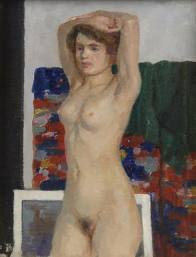Roderick, Molly, Anna and Natasha are out and about in the general vicinity of the ruins where the Kaiser Wilhelm Church is supposed to be. Feeling peckish, Roderick refers to his Baedeker and reads aloud:
Situated at 18/19 Kurfurstendamm, The Cafe des Westens ("Café of the West") was the first coffee house on the Ku'damm when it opened in 1893. Today, it is the most important gathering place for Berlin artists and intellectuals. Here, the traveler can mingle with the likes of writers and critics such as Alfred Kerr and Herbert Ihering, the painter Max Liebermann, composers and musicians (such as Linke, Kollo, Jean Gilbert and Strauss...Anna interjects. "Strauss? I love the Blue Danube."
"I think they mean Richard Strauss," says Molly, helpfully.
Natasha looks puzzled. "There's more than one Strauss?"
"Indeed there are," says Roderick. "There are many Strausses, actually." He proceeds to explain in detail the difference between Johann Strauss, Jr. the beloved "Waltz King" of Vienna, who wrote hundreds of lovely waltzes and polkas to which beautiful couples swirled in gorgeous ballrooms bedecked with flowers, and Richard Strauss, composer of the opera Salome, in which the eponymous anti-heroine demands the head of John the Baptist on a platter, lifts the severed head and kisses it on the lips; after which Herod, disgusted, orders his soldiers to crush her to death with their shields, which they do as the curtain falls.
"Oh", says Anna. "That Strauss."
"Read on", says Natasha.
One can also rub elbows with Maximilian Harden, Christian Morgenstern, Frank Wedekind, Carl Sternheim, Emil Orlik, Else Lasker-Schüler, Herwarth Walden, René Schickele and Paul Scheerbarth.Roderick looks up. "Wow! An establishment frequented by Harden, Morgenstern, Wedekind, Sternheim, Orlik, Lasker-Schüler, Walden, Schickele and Scheerbarth is my kind of place!"
He continues.
Anyone who has made a name for himself can be found here. The painter Emil Orlik, a regular patron, has drawn many pictures of Berlin celebrities in the café...Natasha interrupts. "Did you say Emil Orlik? I just happen to have some of his pictures here in this book." She thumbs through an album and holds up this page:
Molly likes the picture. "Do they let patrons dine naked?"
Natasha frowns. "No, that's a model. Here's one of his drawings of people from the cafe." She holds up the book again.
Roderick examines the picture. "I guess he didn't have a camera handy."
Natasha looks at him like he's retarded. "Of course he didn't. They only invented iPhones recently."
Roderick reads on:
Known to locals as the "Café Megalomania" the cafe is a kind of home for many artists. The "Café Megalomania" is also famous for permitting women to show themselves here in the latest fashions, thus demonstrating support for emancipation...Anna, for one, is relieved that they let women into the place.
The cafe is the center of German Expressionism. Here, avant-garde writers such as Else Lasker-Schuler and her husband Herwarth Walden, René Schickele, John Sleep, Erich Mühsam and John Henry Mackay, Peter Hille, Paul Scheerbart, Frank Wedekind, Artur Landsberger, Carl Sternheim, Leonhard Frank, Solomon Friedlander, John Hoexter and Jakob van Hoddis fight the good fight against Naturalism and Impressionism. The cafe is also home to the literary journals Der Sturm and Action..."Blah, blah, blah," says Natasha. "All I want to know is do they serve a skinny soy latte with flavor shots?"
Roderick closes the Baedeker. "I guess we'll just have to go there and find out. It's right down the Ku'damm."
Unfortunately, though, on arrival at 18 Ku'damm, the quartet finds an upscale restaurant that looks vaguely like an American diner.
"Hmmph" says Roderick. "Must be a misprint."
Anna is disappointed. "I was hoping to see Else Lasker-Schuler."
Molly takes Anna aside. "I think she's dead," she whispers.
Fortunately, there is a Starbucks at the end of the block, so Natasha gets her skinny soy latte with a flavor shot. Good thing. Because when Natasha doesn't get what she wants she gets really grumpy.


